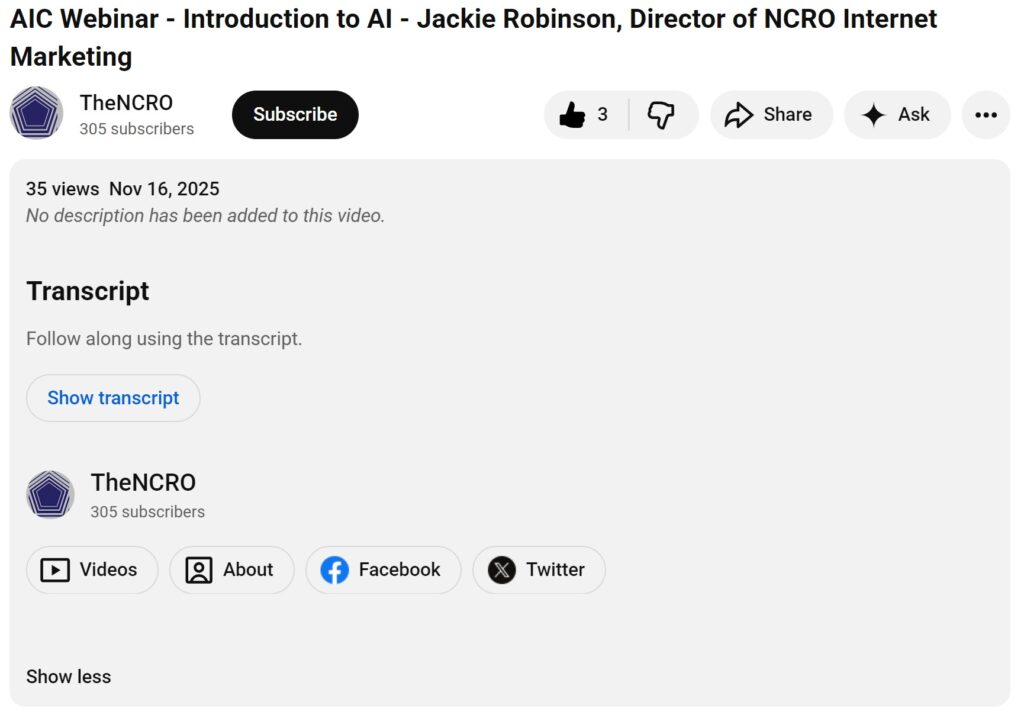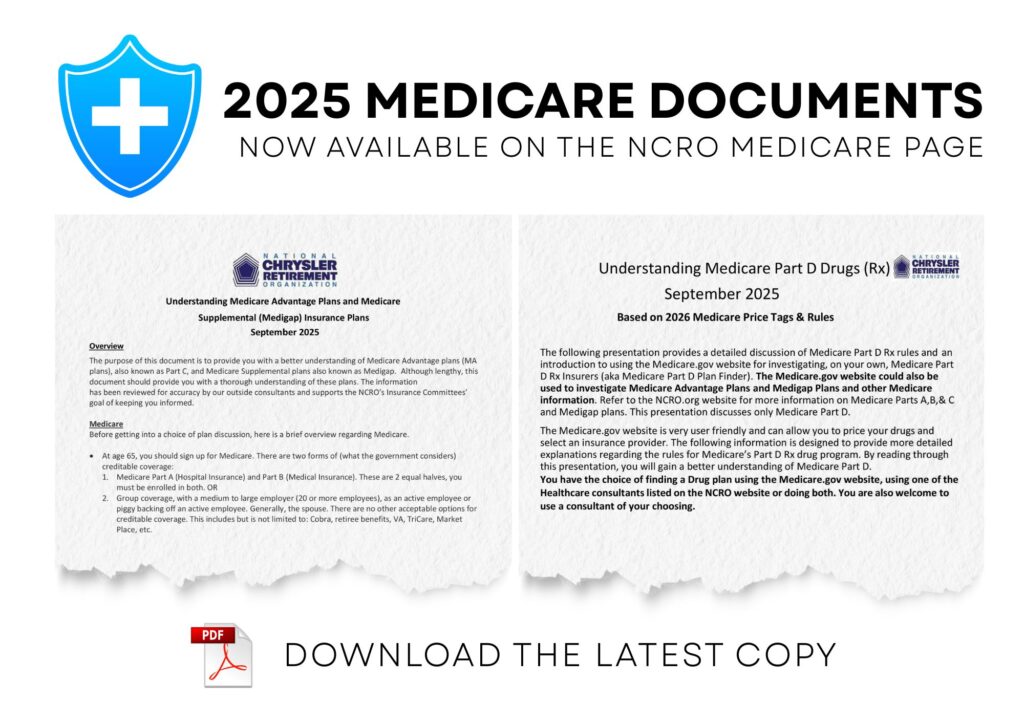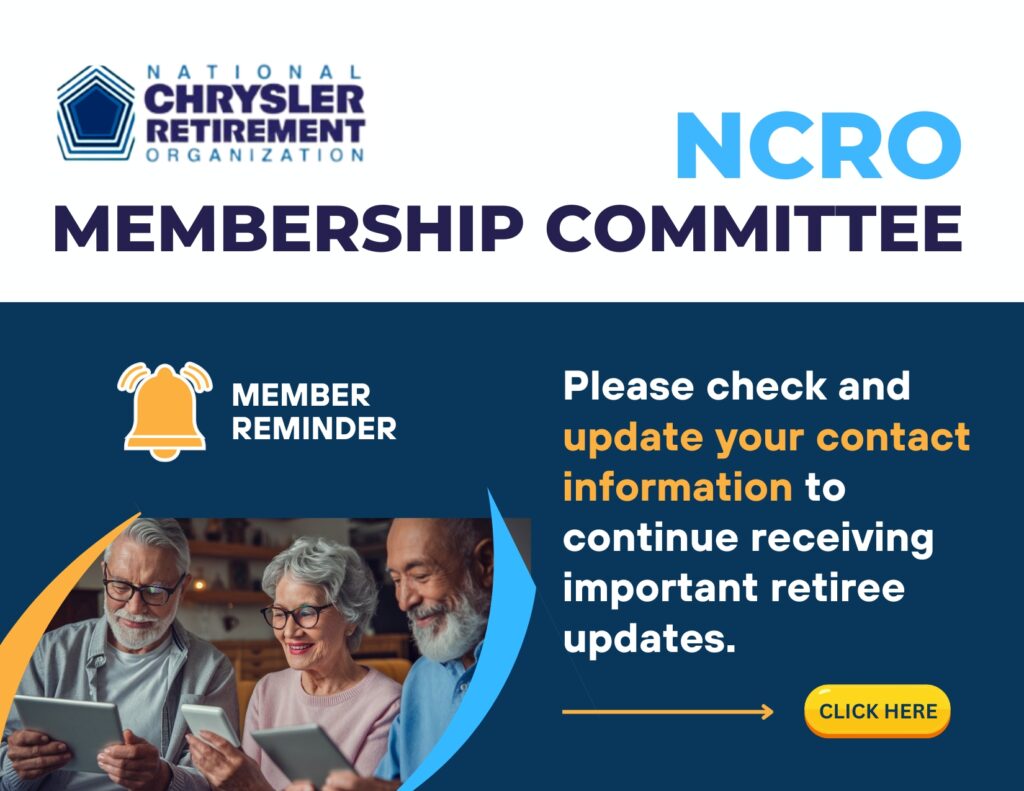When we talk about the strength of the National Chrysler Retirement Organization (NCRO), we’re really talking about you—our members. Your voices, your participation, and yes, your financial support through membership dues are the foundation of everything we do. While dues may seem like a small annual commitment, their impact is significant and far-reaching.
As your NCRO Treasurer, I want to explain exactly where your dues go and why they are essential to protecting and advancing the rights and benefits of every Chrysler retiree.
Your Dues Fuel Our Mission
NCRO exists for one central purpose: to protect the pensions, healthcare, and retirement security of Chrysler retirees. We do this by keeping a vigilant eye on corporate developments, government regulations, and market conditions that could affect retiree benefits. We also serve as a strong advocate in negotiations, legal matters, and policy discussions.
Your dues directly support:
- Legal and Financial Experts – We rely on trusted advisors to analyze pension issues, benefit changes, and corporate restructuring. Their professional insight helps us take timely, informed action on your behalf.
- Legislative Advocacy – Through ongoing contact with lawmakers and regulatory agencies, we work to protect pensions, Social Security, and Medicare. Dues fund our ability to stay active and effective in these policy arenas.
- Benefits Advocacy – Support for retirees receiving income from a variety of sources, including pensions, retirement accounts, and insurance-based retirement benefits.
- Member Communication – From quarterly newsletters to email updates and educational webinars, your dues help us keep you informed. Knowledge is power—especially in retirement.
- Technology and Operations – Running a secure website, maintaining a member database, managing communications, and organizing events all require ongoing investment. Your dues ensure we can do these tasks efficiently and professionally.
Why Annual Dues Matter—Even for Longtime Members
Some retirees may wonder, “I’ve been a member for years—do I still need to pay every year?” The answer is a resounding yes. Because we are an independent, member-funded organization, we do not receive financial support from Chrysler/Stellantis or any government source. Annual dues are our primary source of revenue, and they allow us to budget responsibly, act quickly, and plan for long-term protection of retiree rights.
Even modest dues contributions, when made consistently across our membership, give us the strength and stability to represent you powerfully.
What Happens Without Dues?
It’s simple: without dues, we would lose the ability to protect the benefits we’ve all worked so hard to earn. Legal representation would be unavailable. Advocacy efforts would go silent. Communication would suffer. And retirees could be left without a voice when critical decisions are being made.
In other words, paying your dues isn’t just a transaction—it’s a statement that you believe your retirement security matters, and that you’re willing to be part of the solution.
Every Dollar Works for You
As Treasurer, I can assure you that every dollar of your membership dues is spent with care and accountability. We are committed to transparent financial reporting, and our volunteer-led leadership carefully stewards every contribution. Your support is used responsibly—invested in advocacy, education, and peace of mind for all members.
Help Us Grow, Help Us Serve
Encourage fellow retirees to join NCRO and pay their dues. A growing membership base means a stronger financial foundation—and a louder voice. If every eligible Chrysler retiree became a dues-paying member, the possibilities for our impact would multiply overnight.
We’re not just funding an organization. We’re funding a future where retirees are respected, heard, and protected.
Thank you for your continued support and trust. Paying your dues may be one small action—but it’s one that carries enormous weight for thousands of retirees just like you.
If you have questions about dues or would like to renew your membership, please visit https://ncro.org or email us at tr*******@**ro.org.
Together, we are stronger. Together, we make a difference.
“Educational programs like our Smartphone Cybersecurity webinar are made possible by NCRO Members.
Stay Informed. Stay Protected. Become an NCRO Member Today.
JOIN NOW
01
Content Generated with AI...
...with Edits and Modifications
At NCRO, we are proud to uphold the highest standards of accuracy and quality in all our content. Our articles are meticulously crafted by advanced AI technology, rigorously reviewed, and approved by our dedicated NCRO committees before being shared on our website. This thorough process ensures that our readers receive reliable and credible information they can trust.






 Losing a spouse changes the rhythm of life in an instant. Even when we’ve lived a full life together, their absence is profound, and the days after can feel unfamiliar and hollow. For NCRO retirees, many of us have been blessed with long partnerships—some over fifty years—and the grief can feel like an entire world has shifted. While there is no perfect roadmap for healing, the steps below can provide a gentle guide as you move into this new chapter of life.
Losing a spouse changes the rhythm of life in an instant. Even when we’ve lived a full life together, their absence is profound, and the days after can feel unfamiliar and hollow. For NCRO retirees, many of us have been blessed with long partnerships—some over fifty years—and the grief can feel like an entire world has shifted. While there is no perfect roadmap for healing, the steps below can provide a gentle guide as you move into this new chapter of life.



 Medicare Website
Medicare Website


